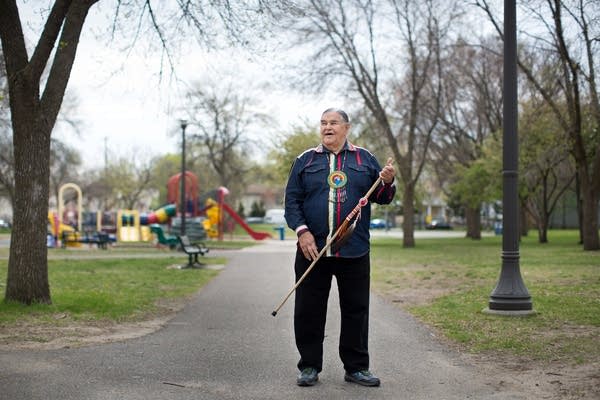Native American activist, leader Clyde Bellecourt dies at 85

Updated: 4:55 p.m.
Clyde Bellecourt, a leader in the Native American struggle for civil rights and a founder of the American Indian Movement, has died. He was 85.
Wolf Bellecourt said his father cared deeply about his family.
"He was an awesome dad. I have a 10-year-old daughter,” he said. “He was really a good grandfather to her, and he'd give her the whole world if he could."
Bellecourt had been fighting prostate cancer in recent years.
Create a More Connected Minnesota
MPR News is your trusted resource for the news you need. With your support, MPR News brings accessible, courageous journalism and authentic conversation to everyone - free of paywalls and barriers. Your gift makes a difference.
In his 2019 interview with MPR News, Bellecourt said that he felt “no fear whatsoever” about dying, adding “I know where I'm going — I'm going home.”
Bellecourt was a co-founder in 1968 of the American Indian Movement, which began as a local organization in Minneapolis that sought to grapple with issues of police brutality and discrimination against Native Americans.
“Clyde was a really good man and influenced a lot of people,” said Winona LaDuke, an American Indian activist and the executive director of Honor the Earth, a group dedicated to raising awareness for Indigenous environmental issues. “He was very influential in my life.”

One of AIM’s first acts was to organize a patrol to monitor allegations of police harassment and brutality against Native Americans who had settled in Minneapolis where AIM is based. Members had cameras, asked police for badge numbers and monitored radio scanner traffic for mention of anyone they might recognize as Indigenous to ensure their rights weren’t being violated.
The group quickly became a national force. It would lead a string of major national protests in the 1970s, including a march to Washington, D.C., in 1972 called the Trail of Broken Treaties.
At times, the American Indian Movement’s tactics were militant, which led to splintering in the group. In one of its most well-known actions, the group took over Wounded Knee on the Pine Ridge Reservation in South Dakota in 1973 to protest U.S. and tribal governments. The 71-day occupation turned violent, and two people died in a shootout.
The group called out instances of cultural appropriation, provided job training, sought to improve housing and education for Indigenous people, provided legal assistance, spotlighted environmental injustice and questioned government policies that were seen as anti-Indigenous.

Bellecourt was born and raised on the White Earth Indian Reservation. His Ojibwe name is Nee-gon-we-way-we-dun, which means “Thunder Before the Storm." He was the only remaining living founder of the AIM movement, Bellanger said.
Bellecourt was among those who protested the 1992 Super Bowl in Minneapolis, when the Washington Football Team beat the Buffalo Bills. The Washington team dropped its old name in 2020 after decades of criticism it was offensive to Native Americans and after pressure from sponsors amid a national reckoning on race in the U.S. Bellecourt long called for the team's name to be changed.
Lisa Bellanger, the current co-director of AIM, said condolences have been coming in from around the globe.
“He was known worldwide,” she said.
Wolf Bellecourt says the family is planning a traditional memorial service.